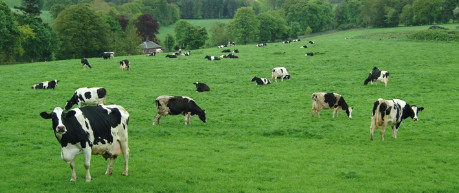Friday 22nd September 2017, 11:00am
A Scottish study that potentially paves the way for the breeding of low-emission livestock has won an internationally respected research prize.

The study, the result of a collaboration involving Scotland's Rural College (SRUC), The University of Edinburgh's The Roslin Institute and The University of Aberdeen, identified a genetic link between host animals, the microbial community in their digestive tract and the methane that they produce. The findings could ultimately help farmers respond to the growing global demand for meat, while minimising the associated environmental impact.
The results were reported in the international research journal PLOS Genetics and won the journal's 2017 annual prize for outstanding research.
Researchers have for some time discussed the possiblity of breeding cattle that generate less methane but it was not known to what extent the cattle genome would influence the make-up of gut microbes.
In the winning study, the researchers explored the interactions between an animal's genetic background, its diet and the composition of its microbial community. They identified microbial community profiles that can be used to recognise cattle that use their feed more efficiently while also emitting less methane.
"In our research, we were surprised to find that the host animal's genetics shapes its own microbiome to the extent that it does and that this is highly informative when predicting traits like methane emissions and feed conversion efficiency."
"In the future we expect that the use of gastrointestinal microbial information will have a great impact in animal breeding and that it will also be of great value in medicine and nutritional recommendations that can be tailored to the individual in many different species, including humans."
Professor Rainer Roenhe, Future Farming Systems, Scotland's Rural College"I am delighted to have been involved in this project, what we - Rowett, SRUC and Roslin, combining our expertise in microbial ecology, animal genetics and bioinformatics, respectively - achieved is very much a first."
"The results have huge implications for breeding farm animals on the basis of their gut microbes, for better digestion of the feed, lower greenhouse gas emissions and many other possible applications."
"We employed a relatively new technique called metagenomics, which involves analysing the genetic composition of an entire organism including the microbes that exist within it."
"Our study demonstrates the power of combining this approach with big data analysis tool to solve a real world problem - in this case breeding more efficient animals."
The PLOS Genetics prize comes with a $5,000 award to the authors. The public nominates worthy papers from the previous year and the PLOS Genetics Editors-in-Chief and Senior Editors make their final selection based on the scientific merit and community impact of the research.
Source: Scotland's Rural College